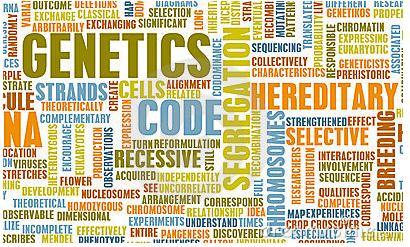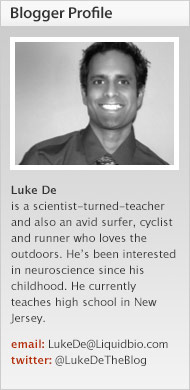« Prev Next »
Learning about one's own genome raises the classic question. How much of my fate is nature and how much is nurture? This knowledge is a very real reminder of our own limitations and an assault on the cherished belief that:
“We can become anything we want.”
“Do not be afraid; our fate cannot be taken from us; it is a gift.”
Last month I wrote about getting an SNP analysis of my genome from a company called 23andMe. This blog describes what happened after I submitted my sample.

23 And The FDA
Two days after I received my results, the FDA asked 23andMe to stop distributing health information uncovered by SNP analysis. The FDA wrote that such information enables users to "take steps toward mitigating serious diseases" such as diabetes, coronary heart disease, and breast cancer. Most of the intended uses for PGS [personal genetics services] listed on your website, a list that has grown over time, are medical device[s].”[i] 23andMe responded by complying with the FDA’s order and saying that it would halt distribution of this information until the issue was resolved. But, as you would expect from a research-based firm, they said that they’ll be back. . . soon.
23 And Information
When I received my information[ii] I scanned the health risks section first. Though I am decently educated[iii] in genetics, my brain basically divided the information in to “bad things I could do more of” and “things I would have to start avoiding.” In my case, the misconception would be that I can eat as much butter as I want, but that I need to avoid sugar. I could see myself employing some very poor behaviors based on the results.
23andMe is comprehensive and
thorough above all. They broke down the
information into several categories.
|
Category |
Specific examples |
|
Health Risks |
Atrial Fibrillation (4, 27.2% +/- 15%)[iv], Type II Diabetes (4, 25.9%+/- 15%), Lung Cancer (4, 8.5% 4) Asthma (3), Narcolepsy (3), Bipolar Disorder (3), Pancreatic Cancer (3), Placental Abortion (2), OCD (1) |
|
Drug Response |
Proton pump Inhibitor (4), Alcohol Smoking and Esophageal Cancer (4), Caffeine Metabolism (3), Anti-Depressant Response (2), and Heroin Addiction (2) |
|
Inherited Conditions |
Phenylketonuria (4), Familial Hypertension (4), Cystic Fibrosis (4), BRCA Cancer Mutation (4), Tay-Sachs (4) |
|
Traits |
Alcohol Flush Reaction "Asian Flush" (4), Male Pattern Baldness, Resistance to HIV/AIDS (4), Biological Aging (3), Growth during early or late adolecence, Food preference sweet and amount of calories (3), Reading abiility/Nonword reading score (3), Sprinting ability (3), Odds of making it to 95 years old (2), Memory (2), Odor Detection (2), Pain sensitivity (2), Avoidance of Errors (1)
|
|
NOTES: The number in parenthesis represents the confidence with which 23andMe is presenting the data. This confidence number is based on the amount of available research on a particular gene/allele. |
NOTES: As many of the results are displayed in “your chances” vs. the natural average, I included the range of resullts for the first 3 conditions. |
|
NOTES OVERALL: The percentages displayed above are the likelihood that you will develop a specific condition. For example, the average person has a 27.2% chance of developing atrial fibrillation. Based on your genetics 23andMe could change your personalized chances to higher, for example 40%, or lower, for example 20%. |
|
I could write a book on the ethical and societal implications of that information, and that is just a select amount of what is provided. Each category/disease has an explanation associated with it, questions you should ask your doctor, and the primary literature on which their test is based. The literature is sourced all available on Pubmed, though you need to pay for some of it. Clearly there is a wealth of information available about you in your spit.[v]
The Test
The Illumina assay that 23andMe uses is highly accurate.[vi] This leaves the genetics and the use of genetic information as the culprit. I don’t have time to review genetics here, but the presence of certain versions of genes only contributes to the majority of conditions. Saying that a gene is solely responsible for something like memory would be like saying your tires determine where your car is currently parked. Though the type of tire on your car contributes to that outcome there are many, many other factors which contribute. Most people's knowledge of genetics is limited to Gregor Mendel and peas. It’s a bad, oversimplified example for the way most genes function. I’ll go out on a limb and say that the overuse of that example generates some pretty strong misconceptions about genetics.[vii]
If used properly, the information can help a person inform a doctor about treatment. For example, one treatment for heartburn might work better than another, based on your genetics. You might avoid eating certain foods because you find you are predisposed to diabetes. Let’s say that I proceed with my misconception of genetics. What do I then do with that information? Here are some scenarios that I generated. A woman might get a masectomy if her BRCA1 information says that she has a higher chance of breast cancer.[viii] A college student might use one drug over another because he might have a predisposition to a certain addiction. A student gives up in school because she learns that she is not a “genetically strong” memorizer.
I believe the FDA is concerned about these kinds of cases and perceived false positives. When I say false positives it is the idea that “if you have the gene, you have the disease.” That is not usually the case. More likely is that if you have the gene, you have a higher likelihood of getting the disease.

Consultation With 23
If I went over the information with a Doctor, the mastectomy situation might be avoided, and the student situation might have been mitigated. But shouldn’t the doctor in charge of the mastectomy have stopped the mastectomy? The problem in this situation is the wealth of information. A doctor is not going to be able to keep up with it, end of story. Most of the information provided by 23andMe is referenced in journals written after 2005.[ix] That is what makes 23andMe a good company. As a company, they stay on top of the information.
To limit the information they provide to accommodate for a lack of education on the part of the American public or the hypothetical doctor seems ludicrous. Let’s rephrase that.
We should not limit the availability of information to the public to offset the the public’s lack of understanding.
Perhaps 23andMe should encourage the formation of a genetics geek squad. Like the geek squad, privatized and specialized, they could come over to your house and do for you what many could have done for ourselves, but simply don’t have time to do.[x]
23 and The Plan
In my case, I am going to go over the information and read the journals. Though it is likely to take a year, the information WILL help me. I realize now why I hesitated when getting the test. I was afraid that 23 and me was going to tell me about my limits and tell me that my gifts were a result of my genetics and not my own hard work. The first point is ludicrous.[xi] Knowledge of your own genetics is only knowledge of your mechanics, not your future. 23 and me could only tell me what already was. My genetics were determined long ago by two Indian students who came to America on a dream.[xii] It’s unfortunate that it took so long for me to clearly see what they made and what I am.
Concerning the second point, it sucks. It turns out that 23 and me predicted that I am an endurance person rather than a sprinter. I just ran a 12 mile Tough Mudder in Philly. That means I had a genetic leg up.[xiii] That’s ok. I still worked hard. The information changes nothing about who I am or what I did. The information also told me that I am less likely to learn from my mistakes than others. Almost all negatives, can be a positive. I am nothing if not tenacious. Based on the available information, my memory is genetically average, which to me, translates into intelligence. Well, I encourage you to challenge that. Your opportunity is below.
Acknowledgements
Thank you to Khalil Cassimally who is moving on to bigger better things than correcting my errors. Good luck Khalil!
Thank you to Krista Maxwell who is currently correcting my work and making everything I say sound so much better.
Thanks Cara Solina, I wrote this before she generated the picture, but I know it's going to be good. There is always a Solina original on my wall at home.
[i] FDA Website accessed 2013.12.12 http://www.fda.gov/ICECI/EnforcementActions/WarningLetters/2013/ucm376296.htm
[ii] Chris Kemp suggested that I would find out that I was actually Mexican. It turns out that I am 93% Indian/Pakistani. I am happy about this because both my parents also appear to be Indian/Pakistani.
[iii] Thank you Wash U and Jeff Friedman
[iv] The first number indicates 23 and me’s confidence in the result. They base this on the number of people looked at in studies available from Pubmed. These are all cited and available on the website.
[v] I am not recommending that people examine their spit for signs of the future. 23 and me obtains your genome from the cheek cells in your spit.
[vi] You can find a wealth of citations by either searching pubmed or by clicking on the illumina assay link.
[vii] I think Mendels examples are overused because students can easily see what is happening. They also involve punnet squares which are easily generate thought based questions.
[viii] Somebody told me that Angelina Jolie did this, but as of last Tuesday, Mrs. Jolie and I are not speaking. Though we weren’t speaking before Tuesday, phrasing it as I did seems to indicate that we were.
[ix] This is just an estimate.
[x] Turn off and on your computer, and then watch a youtube video on the fix.
[xi] I’ve been overusing the term ludacris because I have recently been listening to Ludacris (the rapper) way to much of late
[xii] That is to say that one of them gave birth to me. They didn’t create me in a lab as many people secretly suspect.
[xiii] pointing out a pun
























